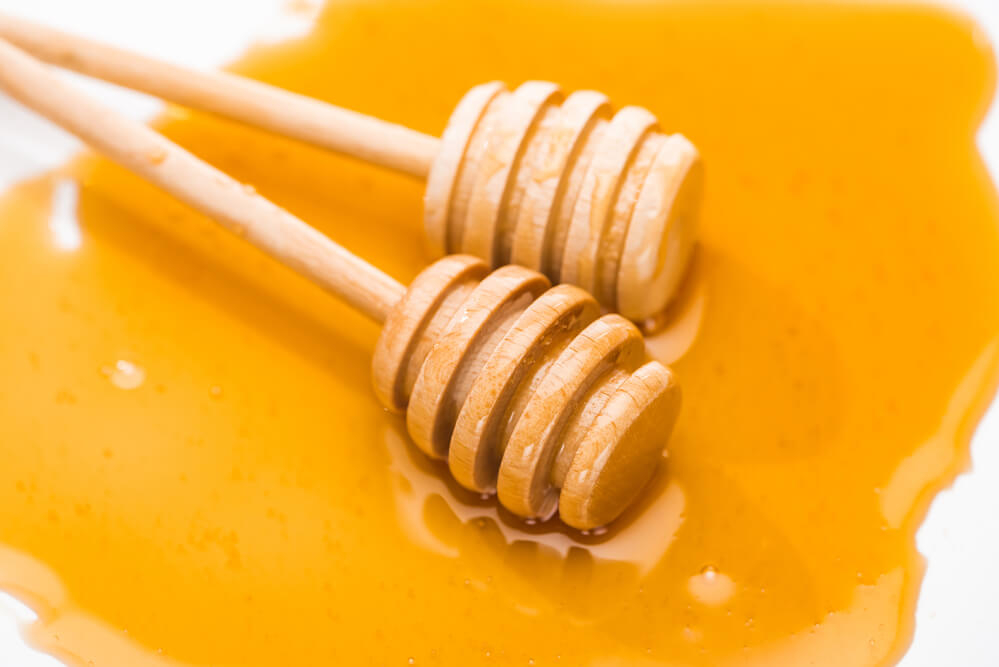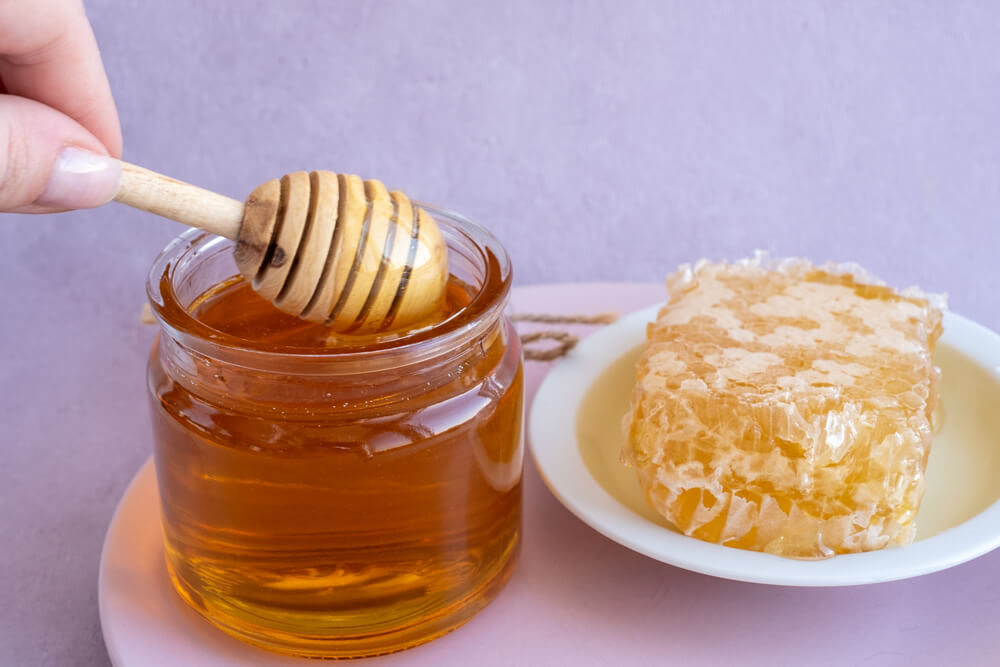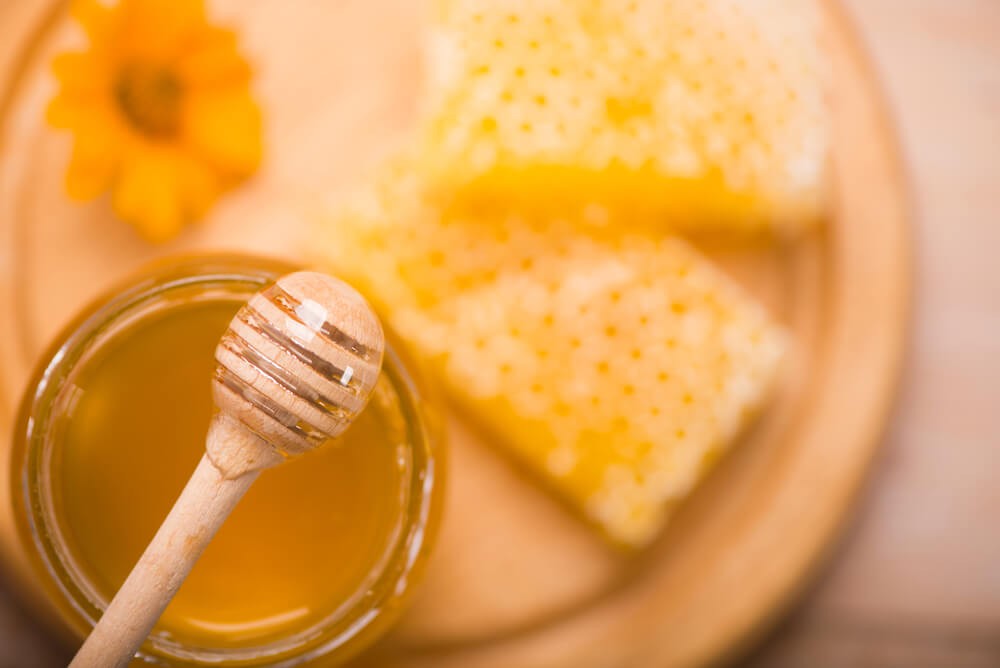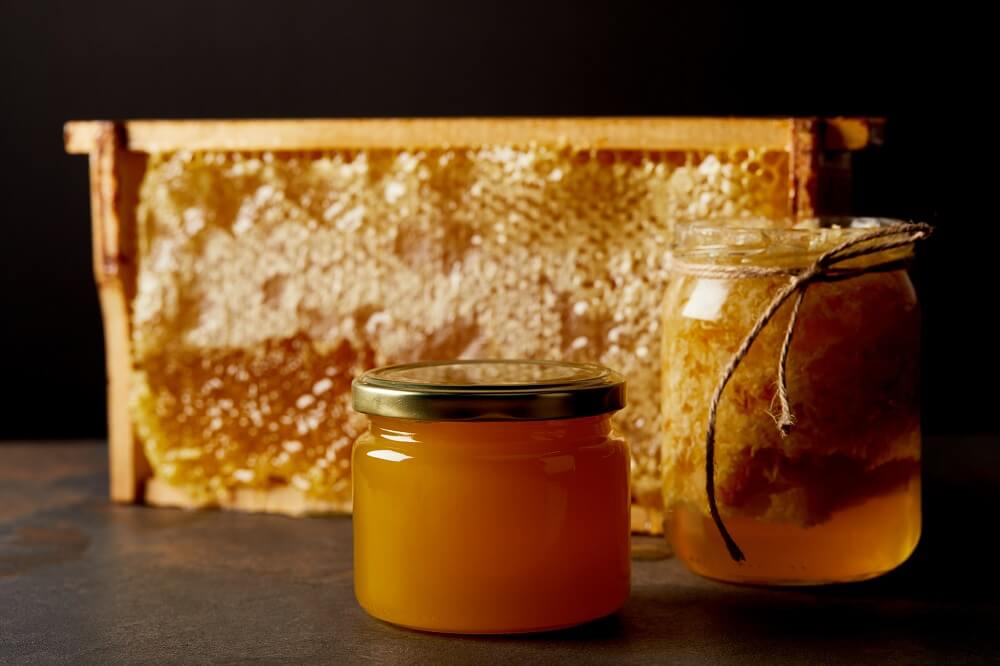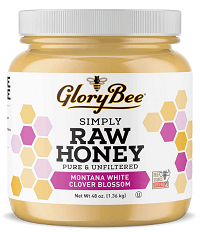Allergic to Honey Symptoms
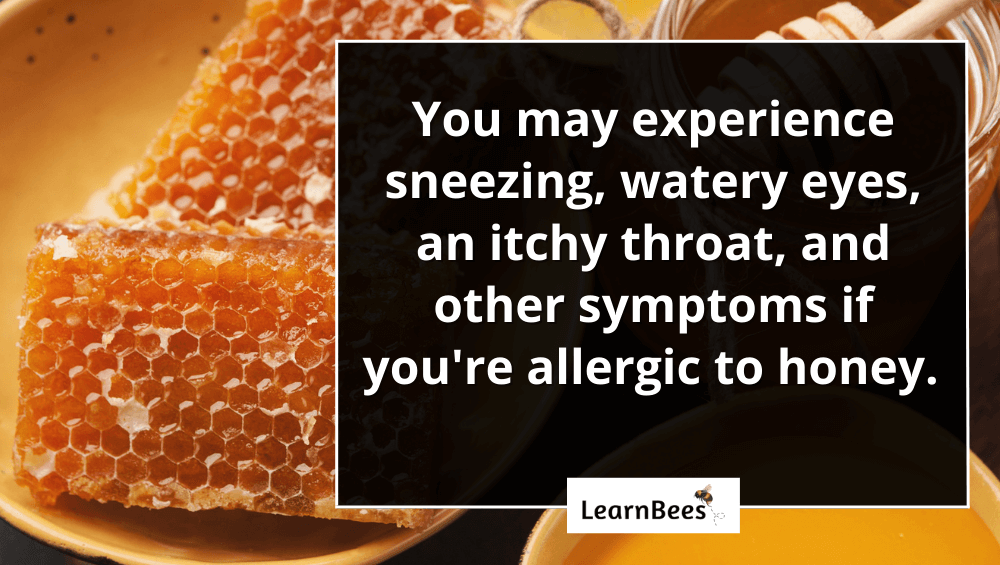
While raw honey is considered a superfood thanks to its antibacterial, antiviral, and anti-inflammatory effects, it’s still possible for some people to be allergic to it.
But here’s the thing:
It’s not necessarily the honey you’re allergic to. Instead, you’re most likely allergic to the traces of pollen found inside raw honey.
Think about it this way:
A honeybee’s main diet consists of nectar and pollen from flowers. Honey is made from nectar, not pollen. That said, sometimes small traces of pollen will fall off the honeybee’s fuzzy body and into the honey.
As such, if you’re allergic to pollen, then you might also be allergic to honey.
But how can you tell for sure?
Let’s discuss the symptoms.
Mild Honey Allergy Symptoms:
- Sneezing
- Watery eyes
- Runny nose
- Itchy throat
- Swelling
- Rash
Symptoms of an allergic reaction to honey may differ between people. Eating honey or coming into contact with it might cause an allergy.
Severe Honey Allergy Symptoms:
- Vomiting
- Nausea
- Fainting
- Wheezing
- Headaches
- Hives
- Irregular Heartbeat
- Diarrhea
- Anaphylaxis
After eating raw honey, contact your doctor immediately if you have severe allergy symptoms.
Additionally, children under 12 months old should never be given honey. Honey can contain bacteria that leads to infant botulism, a rare but serious foodborne illness. Once children are over 12 months, they can consume honey because their immune system is more mature.
Treating a Honey Allergy
You can treat honey allergy symptoms with an over-the-counter antihistamine like Benadryl. Get medical attention immediately if your allergy symptoms worsen or don’t improve after an hour.
Are you Allergic to Honey if You’re Allergic to Bees?
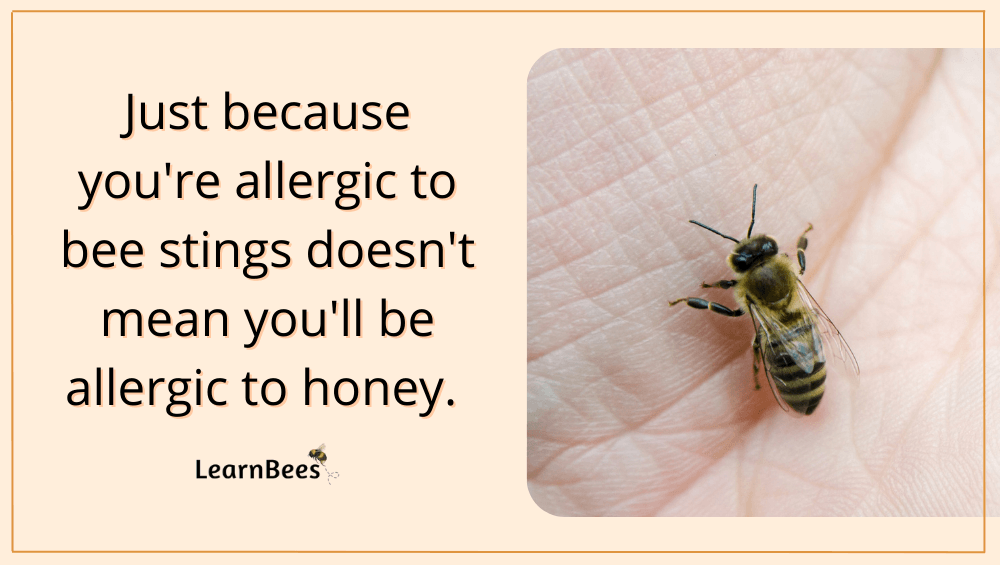
When people are allergic to bees, they really mean they’re allergic to the venom from bee stings.
When people are allergic to honey, it typically means they’re allergic to the small traces of pollen found in raw honey, not the honey itself.
Fortunately, honey doesn’t contain bee venom. So even people who are allergic to bee stings can enjoy honey, as long as they aren’t allergic to pollen.
And it’s important to mention:
Honey is high in fructose, so people with irritable bowel syndrome (IBS) may experience digestive issues like gas, diarrhea, and bloating when eating honey.
But also, keep in mind:
Most of the honey you get from the grocery store is processed honey.
According to the FDA, overly processed honey is no longer considered real honey. That’s because it goes through a pasteurization process that heats and filters it. What’s more, artificial sweeteners are often added in to cut production costs.(1)
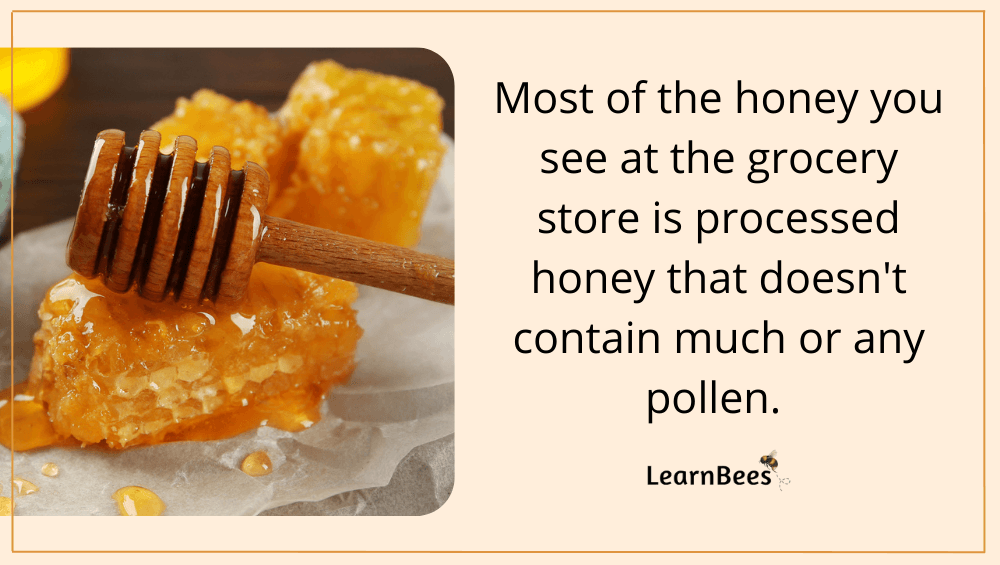
So what does this mean for you?
It means processed honey is less likely to contain pollen than raw honey. This is because the pollen is filtered out during pasteurization.
But there’s a downside to this.
The downside is that processed honey is more like sugar syrup than actual honey.
Raw honey loses many of its health benefits once it’s pasteurized. This includes the antioxidants and enzymes that make raw honey antibacterial, antiviral, and anti-inflammatory.
Now you might be asking:
How do I tell raw honey from processed honey?
Pay close attention to the label. Raw honey is labeled “raw” or “unpasteurized.”
That said, some honey producers use words like “organic,” “natural,” and “pure” to label their honey. These buzz words sound good but don’t necessarily mean the honey is raw.
Look for”raw” or “unpasteurized” on the label instead.
You can also purchase raw honey directly from a local beekeeper.
Is There a Honey Allergy Test?
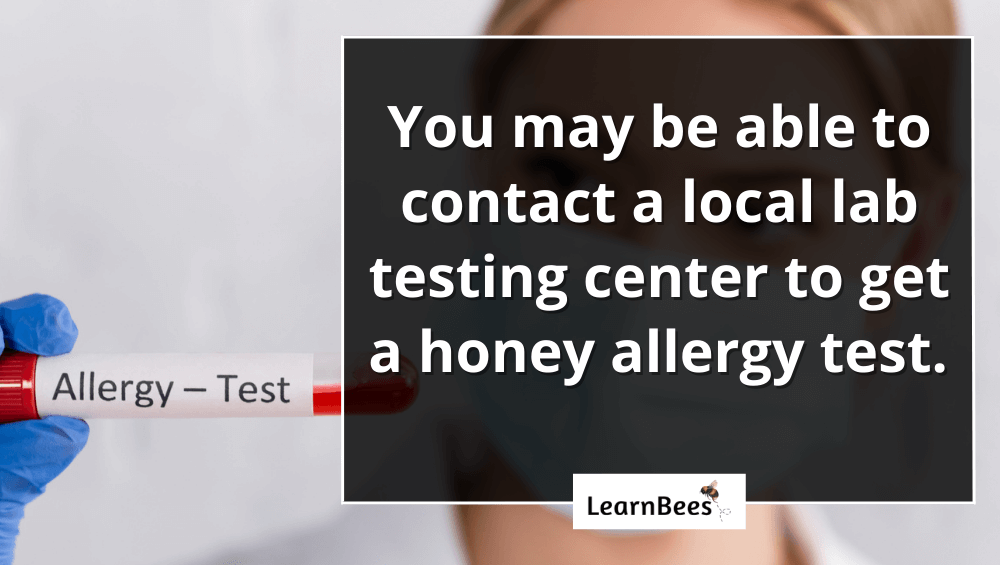
There are honey allergy tests available. You’ll have to contact your local lab testing center to get the test administered.
The honey allergy test usually takes no more than 15 minutes, and you’ll get results back within one to three days.
The honey allergy blood test measures the amount of allergen-specific IgE antibodies in the blood to detect a honey allergy.
Although raw honey has its fair share of health benefits, some people develop an allergy to it. When honey is made by honeybees, it can potentially contain pollen from plants such as:
As mentioned, this often makes the pollen found in honey the allergen, not the honey itself.
FAQs on the Allergic to Honey Symptoms
- Is honey good for allergies?
- How do you know if you are allergic to honey?
- How long does a honey allergy last?
- Can you have a food sensitivity to honey?
- Why does honey make me feel sick?
- Why does honey irritate my throat?
- Can local honey cause allergy symptoms?
- Can honey cause digestive problems?
- Why does honey give me diarrhea?
- Does honey cause inflammation?
- Can raw honey make allergies worse?
- What causes a honey allergy?
- Is it possible to have a honey allergy on my face?
- Can you be allergic to manuka honey?
Is honey good for allergies?
Honey hasn’t been scientifically proven to be good for allergies.
But the idea isn’t far-fetched, though. Many people have used allergy honey treatments as a natural remedy for allergies.
According to anecdotal evidence, raw honey has been observed to help with seasonal allergies. However, these findings have yet to be reproduced in clinical trials.
That said, in clinical trials, honey has been shown to be a good cough suppressant with antibacterial and anti-inflammatory benefits. Honey has been shown to contain traces of flower pollen, which is an allergy trigger.
Repeated exposure to minor amounts of allergens is considered by many as an approach to alleviate allergies.
But for the time being, honey appears to just be a sweet treat with antibacterial, antiviral, and anti-inflammatory benefits. There’s no scientific evidence suggesting that honey is a cure for allergies.
That said, you can try it to see if it works for you.
Just don’t give honey to babies under a year because it has an elevated risk of infant botulism, a rare yet dangerous foodborne illness.
—> Go back to the FAQs on the allergic to honey symptoms
More to Explore:
- Honey For Allergies: Is it a Potential Cure?
- Honey Pasteurization: Does it Ruin Raw Honey?
- Honey for Skin Benefits: Directions, Uses, & Risks
How do you know if you are allergic to honey?
You might experience a honey allergic reaction if you have a pollen allergy and consume raw honey.
The best way to know for sure if you’re allergic to honey is to get a blood test administered by a local lab testing center.
You may also experience the following mild symptoms:
- Itchy eyes
- Runny nose
- Sneezing
- Coughing
- Watery eyes
- Itchy throat
- Rash
Severe honey allergic reactions include:
- Anaphylaxis
- Trouble breathing
- Swelling in the throat
- Hives
- Dizziness
- Vomiting
- Fainting
- Diarrhea
—> Go back to the FAQs on the allergic to honey symptoms
More to Explore:
How long does a honey allergy last?
Mild honey allergies are typically mild, usually only lasting a few hours with symptoms such as sneezing, coughing, or a runny nose.
More severe honey allergies may include symptoms such as anaphylaxis, which is a potentially life-threatening condition. If you experience severe honey allergic reactions such as trouble breathing, swelling in the throat, or hives, you should seek medical attention immediately.
—> Go back to the FAQs on the allergic to honey symptoms
More to Explore:
Can you have a food sensitivity to honey?
Yes.
But there is a difference between a food sensitivity and a honey allergic reaction.
The distinction between a food allergy and sensitivity is the body’s reaction. When you have a food allergy, your immune system is what causes it. If you have a food sensitivity, the digestive system is what causes it.
Food sensitivity symptoms include bloating, gas, diarrhea, constipation, nausea, and cramping.
Symptoms of a honey food allergy include itching, swelling, hives, anaphylaxis, and dizziness.
Food sensitivities are more common than food allergies. The good news is that food sensitivities are not life-threatening. Instead, they’re caused by an inability to digest or process food.
Food sensitivity to honey starts with intolerance in your digestive tract.
You may be sensitive to food for various reasons. Here are a few of them:
- not having the correct enzymes you need to digest the food
- reactions to food preservatives or additives like MSG, sulfites, or artificial colors
- pharmacological factors, like intolerance to caffeine or other compounds
- sensitivity to the sugars naturally found in certain foods
—> Go back to the FAQs on the allergic to honey symptoms
More to Explore:
Why does honey make me feel sick?
Honey could make you feel sick because you’re allergic to honey or have a food sensitivity to it.
Honey allergies are rare, but they do happen. It usually occurs because you’re allergic to the small traces of pollen found within honey.
—> Go back to the FAQs on the allergic to honey symptoms
More to Explore:
Why does honey irritate my throat?
People often ask, “Can honey worsen a sore throat?”
In most cases, honey should not irritate your throat. However, if you experience irritation after eating raw honey, it could mean you’re allergic to honey.
This is because honey contains small amounts of pollen that agitates many people’s allergies.
That said, honey allergies are rare. And just because you’re allergic to bee stings doesn’t mean you’ll be allergic to honey. People who are allergic to bee stings are actually allergic to bee venom.
People who are allergic to honey are typically allergic to the pollen found in honey.
—> Go back to the FAQs on the allergic to honey symptoms
More to Explore:
Can local honey cause allergy symptoms?
Yes, local honey is typically raw honey from a beekeeper in your area. Raw honey is honey that comes directly from the honeybee hive. It hasn’t been filtered, heated, or pasteurized in any way.
This means that raw honey may contain small amounts of pollen because it’s left in its natural state. So people with pollen allergies may experience allergy symptoms after consuming local honey.
—> Go back to the FAQs on the allergic to honey symptoms
More to Explore:
- The Top 3 Best Manuka Honey Brands
- Orange Blossom Honey: Uses, Benefits, & Risks
- Sourwood Honey: Uses, Benefits, & Risks
Can honey cause digestive problems?
Yes, honey can cause digestive problems if you have a food sensitivity to honey. This is especially true with individuals with irritable bowel syndrome (IBS).
Honey may trigger IBS symptoms like bloating, gas, diarrhea, and abdominal pain. If you have IBS, it’s best to try honey in small amounts to see if it flares up these concerns. If it does, avoid honey or foods with honey as an ingredient.
—> Go back to the FAQs on the allergic to honey symptoms
More to Explore:
Why does honey give me diarrhea?
Honey contains fructose which is a natural sugar that can lead to incomplete fructose absorption associated with symptoms like diarrhea.(2)
Additionally, eating large amounts of sugar from any source (such as too much honey or candy) will often cause diarrhea.
—> Go back to the FAQs on the allergic to honey symptoms
More to Explore:
- The Brutally Honest Truth About Sour Honey
- Buckwheat Honey: Uses, Benefits, & Risks
- Can You Eat Honeycombs?
Does honey cause inflammation?
No, raw honey should actually reduce inflammation because it’s anti-inflammatory. As such, honey is frequently used as a topical wound dressing for burns, scratches, or even diabetic foot ulcers.
In fact, one study showed that raw honey had a 97% success rate at healing diabetes-related foot ulcers.(3)
So if you’re experiencing inflammation, try using raw honey as a natural remedy.
—> Go back to the FAQs on the allergic to honey symptoms
More to Explore:
Can raw honey make allergies worse?
People often ask, “Can honey make seasonal allergies worse?”
Yes, people can experience an allergic reaction to honey if they’re allergic to pollen.
Raw honey contains small amounts of pollen, which can cause an allergic reaction in some people. If you’re allergic to pollen, avoiding honey or any foods containing honey is best.
However, just because you’re allergic to bee stings doesn’t mean you’ll be allergic to honey. Allergies to bee stings come from the bee venom. On the other hand, people who are allergic to honey are typically allergic to the pollen found in honey.
Raw honey is the most likely to contain pollen because it hasn’t been filtered and pasteurized like processed honey.
—> Go back to the FAQs on the allergic to honey symptoms
More to Explore:
What causes a honey allergy?
Raw honey allergies are rare, but they can happen.
They’re usually caused by an allergy to the pollen found in honey. You may experience an allergic reaction after consuming honey if you have a pollen allergy.
Additionally, people with IBS may experience digestive problems after consuming honey. This is because honey contains fructose which can lead to incomplete fructose absorption and diarrhea.
If you have an allergy or sensitivity to honey, it’s best to avoid it or any foods containing it.
—> Go back to the FAQs on the allergic to honey symptoms
More to Explore:
Is it possible to have a honey allergy on my face?
Yes, you might experience itching or a rash on the skin if you have an allergic reaction to honey.
—> Go back to the FAQs on the allergic to honey symptoms
More to Explore:
Can you be allergic to manuka honey?
Yes, some people experience an allergy to manuka honey. However, it’s primarily because of the pollen in manuka honey and not the honey itself.
You’ll know if you’re allergic to manuka honey if you experience a runny nose, sneezing, wheezing, and headaches. If you have a severe reaction, you may experience difficulty breathing and swelling of the lips, tongue, and throat.
If you’re allergic to manuka honey, it’s best to avoid it or any foods containing it.
Additionally, if you’re allergic to manuka honey, you may experience an allergic reaction to other types of honey, such as clover, wildflower, or blueberry honey.
